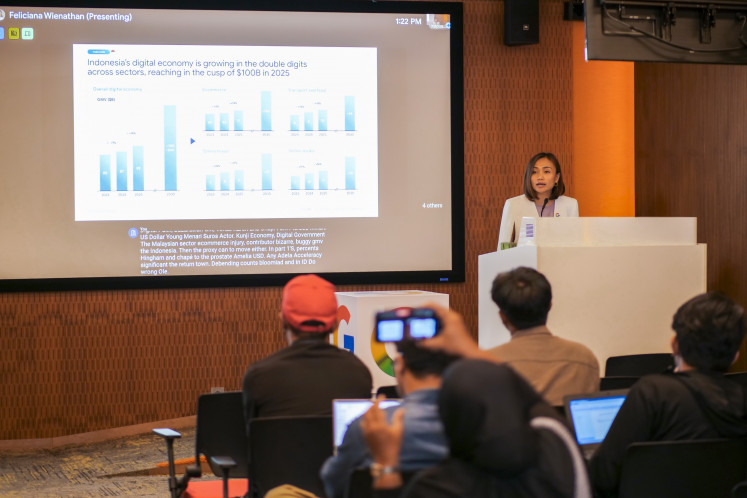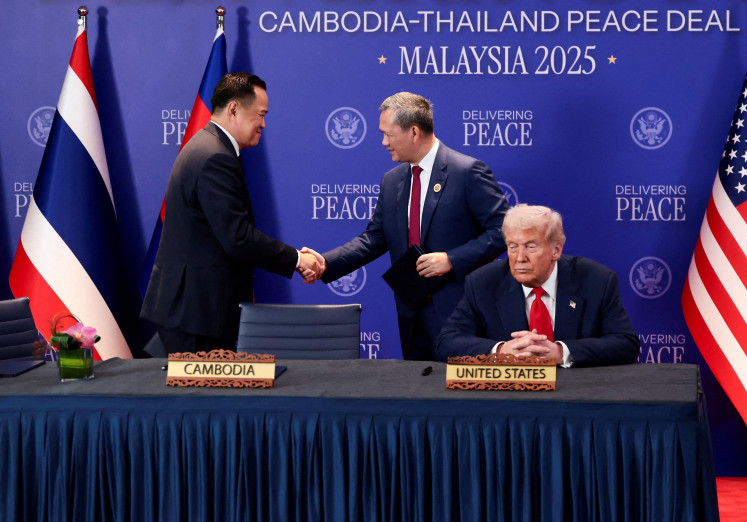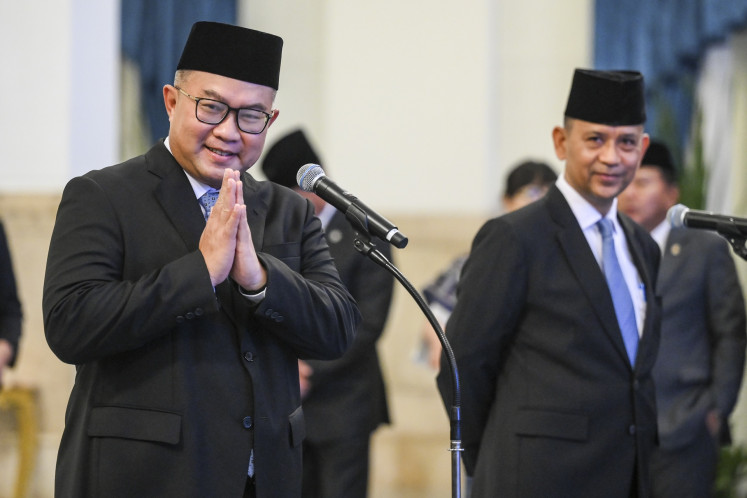Popular Reads
Top Results
Can't find what you're looking for?
View all search resultsPopular Reads
Top Results
Can't find what you're looking for?
View all search resultsAnies no better, no worse than Ahok, survey shows
While people are still largely polarized after the 2017 gubernatorial election, a survey has found that Jakartans, despite their approval of Jakarta Governor Anies Baswedan, consider several policies of his predecessor to have been better
Change text size
Gift Premium Articles
to Anyone
W
hile people are still largely polarized after the 2017 gubernatorial election, a survey has found that Jakartans, despite their approval of Jakarta Governor Anies Baswedan, consider several policies of his predecessor to have been better.
The survey, conducted on Sept. 9 to 18 by pollster Populi Center, questioned 600 people in six Jakarta municipalities, comprising 300 “experimental respondents” and 300 “control respondents”.
The division of respondents was aimed at gaining unbiased responses caused by biased perceptions of Anies and his predecessor Basuki “Ahok” Tjahaja Purnama, who competed against each other in the bitterly contested election that was largely influenced by sectarian rallies against Ahok, a Christian of Chinese descent.
Those in the experimental group were asked for their opinion of policies of the two leaders, while control group respondents were asked about city policies without mentioning Anies, Ahok or words related to them.
The survey revealed that Jakartans are mostly satisfied with Anies’ performance in the last two years, but in a modest way. In the survey, 41.5 percent of the respondents said Jakarta had seen only "a few improvements", more than those felt there had been “a lot of improvements” at 31.7 percent.
Jakartans are generally satisfied with Anies’ performance, with 7 percent saying they were very satisfied, 58.5 percent saying they were satisfied, while 26.8 percent said they were not satisfied and 1.3 percent saying they were dissatisfied.
Populi researcher Jefri Adriansyah said the survey aimed to gauge the level of satisfaction with Anies’ tenure despite the polarization caused by the 2017 election.
He said Populi did the same survey in 2018, but did not get satisfying results due to the polarization issue.
“We did the control-experimental poll because in our previous survey, the respondents only said that what Anies [or Ahok] did was correct. So it was prone to bias,” Jefri said on Monday.
In the latest survey, the level of satisfaction was more apparent in how the respondents differed in their opinions on various city policies.
One of the questions asked was about the city’s flood management. Some 37 percent of experimental respondents said that Ahok’s “normalization” river policy that involved clearing riverbanks and building concrete embankments along rivers was better, but more agreed with Anies’ restoration policy involving planting trees and river-dredging at 52 percent.
Anies has avoided clearing riverbanks and building concrete embankments because it involves evicting people who live in the area, which was controversial during Ahok’s tenure.
However, when the control respondents were asked the same question without mentioning Anies, Ahok, or words associated with them, 50.7 percent said that Ahok’s normalization program involving widening rivers was a better method, compared to Anies’ restoration program involving planting trees, which was supported only by 35.7 percent of the respondents.
On the Jakarta Bay reclamation, the experimental respondents supported Anies at 46 percent, more than Ahok at 31.3 percent, but in the control group, Ahok’s policy was favored at 41 percent compared to Anies' 28.7 percent.
Ahok went all out in pushing the Jakarta Bay reclamation by issuing permits and regulations to support the construction of man-made islands in the northern part of the city. Anies has been moderate about running the project, but has not totally halted it.
“These differences show that the name of the leaders still affect residents' evaluation of public policies, although this is not a good way to evaluate public policies because Anies' supporters are many and polarization is still high,” Jefri said.
In the 2017 gubernatorial election, the Anies-Sandiaga Uno ticket garnered 3.2 million votes, or 58 percent of the Jakarta electorate, while the Ahok-Djarot Saiful Hidayat ticket only won 2.3 million votes, or 42 percent of the electorate.
Meanwhile, on complaint handling by City Hall, both groups considered Ahok's method better at 60 percent and 63 percent, respectively, compared to Anies at 27.7 percent and 27.3 percent. The same results applied for the complaint handling app Qlue, in which both groups considered Ahok better.
Anies got approval from both groups of respondents on his opening of the National Monument (Monas) compound for community events, including religious ones. In the experimental group, he was supported at 79 percent while in the control group, he was supported by 78.7 percent.
Trisakti University urbanist Nirwono Joga said governors of Jakarta should not be obsessed with claiming a policy or a program, because it might prompt the next governor to discontinue or abandon it, considering it a predecessor’s legacy.
Nirwono said one example was the integrated child-friendly public space (RPTRA) program initiated by Ahok, of which 290 RPTRAs were built during Ahok's tenure, while Anies has focused on the Taman Maju Bersama (Move Forward Together Park) program instead.
“Jakarta won’t progress much with this model of every new official using a new name [for their program]. This makes planning in Jakarta inconsistent with the 2030 RTRW and RTDR [spatial plans],” Nirwono said.
Nirwono also criticized Anies for not acquiring land along rivers in the last two years for the Ciliwung-Cisadane Flood Control Office (BBWSCC) for more effective flood management.
Public policy expert Agus Pambagio said that elected governors should not be obsessed with building legacies through their programs, and should instead follow prevailing laws and regulations for their programs.
“Whoever the governor is, their programs should follow prevailing laws, and if change is needed, there should be scientific proof for it,” Agus said.










